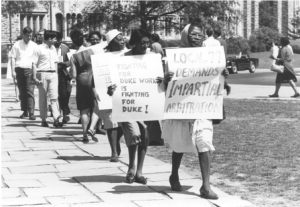Modesty: A Retraction
First, some embarrassing photos:
That hair! What was I thinking? (Don’t miss the West Texas concho leather belt.) But, on the other end of the spectrum, this hair! What was I thinking? Read more
Mar 9
First, some embarrassing photos:
That hair! What was I thinking? (Don’t miss the West Texas concho leather belt.) But, on the other end of the spectrum, this hair! What was I thinking? Read more
Mar 2
Someone with The Martyrs Project contacted me to ask if I would post about them. Their icon looks like the one for the Blair Witch Project, crafted to convey: IMPORTANT, ANCIENT, and SCARY. “WHAT WOULD YOU DIE FOR,” the opening screen from the Martyr Project states. (There is no question mark, so it doesn’t actually ask.)
My gut response is: “Blech.” Read more
Feb 4
A strange, large metal thing sat on the table next to the powerpoint screen. It looked like a trophy, maybe. “What exactly is this,” I asked an older gentleman in a cowboy hat sitting up front. He looked at me like I am daft. “It’s a trophy.” “Oh, yeah, right,” I nodded. “But, what, exactly is it? Is this some sort of car part?” “It’s a piston.” Ah. Yep. “Are pistons usually this big?”
The dozens of men and two women at last weekend’s Annual Training Seminar in Ministry in Motor Sports were exceedingly kind about my ignorance. Lucky for me, these guys walk the walk. Just about all of the sessions had “PATIENCE” as one of the bullet points. Read more
This meditation is for a Lenten devotional booklet for a Duke community. It was specifically to be related to the passage from John’s gospel and also to the 50th anniversary of matriculation of African-American students to Trinity College. We will link to the entire booklet once it is available.
Scripture for meditation: John 3:16-21
‘For God so loved the world that he gave his only Son, so that everyone who believes in him may not perish but may have eternal life. Indeed, God did not send the Son into the world to condemn the world, but in order that the world might be saved through him. Those who believe in him are not condemned; but those who do not believe are condemned already, because they have not believed in the name of the only Son of God. And this is the judgement, that the light has come into the world, and people loved darkness rather than light because their deeds were evil. For all who do evil hate the light and do not come to the light, so that their deeds may not be exposed. But those who do what is true come to the light, so that it may be clearly seen that their deeds have been done in God.’

Employees, students, and faculty in solidarity for the dignity of work at Duke. In front of the Duke Administration Building, April 19, 1967. Courtesy of Durham Civil Rights Heritage Project, Duke University Labor Organizing, 1961-1968, Durham County Library. Photograph by Bill Boyarsky.
John 3:16 is tried and true. Apart from the 23rd Psalm, I would wager it is the best-known scrap of biblical knowledge in America. Its tried and true-ness may also tinge it as tired-out – as a too-readily recited word for a justice-starved world. But I cannot keep thirsting for justice without this truth about the Word who is Jesus Christ. Lent is a time for digging and sleuthing, for doing the archival work of the soul. This includes one’s own individual soul, and also the soul of a community, of a neighborhood, of a city, of a school. Lent is a time for uncovering the detailed mess of our history, and I recommend this discipline of memory right alongside the strange assurance that God means salvation for us. I do not know how else to suggest that someone fully reckon with the history of race at Duke without also signaling, like a simple sign on a back-country road: “For God so loved the world . . .” With this faith, I see this photograph as a call for repentance and encouragement. John 3:17-21 is a call to walk into the light, knowing that the bare, soul-searching work of memory is a practice of salvation, not condemnation. There is a profligate grace given through Jesus Christ, grace to uncover our sins.
Prayer: Lord, not all our deeds have been done in God. Some of our back stories are too painful or too wicked or too cowardly to recall. I would rather shut my eyes. Lord, can’t we just move forward? Help me to know you mean to save me? Help me to feel your forgiveness, so that I can confess?
Jan 26
 One of the most beloved professors in the Yale American Studies Department used to point to the worn elbows of his tweed jacket and say “It is one thing to wear old tweed! But be sure not to become one of those scholars with tweeds-of-the-mind!” I tried to draw on his (much quoted) phrase in a faculty meeting, to explain my concern about how the theological academy can warp women’s brains and stunt our scholarship. We can become so determined to prove to our pious students that we really, really love Jesus; that we really, really are orthodox, it is like we “tie our brain up in a corset,” I said. The room was full of men, and they seemed baffled by my comment. Later, a male friend explained that many of them were probably too distracted by mental images of corsets to get my point. Sigh.
One of the most beloved professors in the Yale American Studies Department used to point to the worn elbows of his tweed jacket and say “It is one thing to wear old tweed! But be sure not to become one of those scholars with tweeds-of-the-mind!” I tried to draw on his (much quoted) phrase in a faculty meeting, to explain my concern about how the theological academy can warp women’s brains and stunt our scholarship. We can become so determined to prove to our pious students that we really, really love Jesus; that we really, really are orthodox, it is like we “tie our brain up in a corset,” I said. The room was full of men, and they seemed baffled by my comment. Later, a male friend explained that many of them were probably too distracted by mental images of corsets to get my point. Sigh.
I think I was beset by the evangelical “corset effect” last week during a Duke Women’s Center discussion on masculinity. The discussion will evidently be available online soon, and I hope this can stand as a substantial epigraph to that posting.
First, some backstory. Years ago, when I started teaching on sex and gender at Duke, I took advice from some of the guys in the Mennonite Mafia in the doctoral program at the time and assigned the book Fight Club. A really important passage in that book involves a penis (not symbolically, but quite literally) and, when it came time to talk about the book in class, I was unable to say the word. It was crazy. When Peggy Hill (life-partner of King of the Hill) has to teach sex-ed in the Arlen, Texas middle-school, she is similarly tongue-tied, which gives me some solace. A few students found my incapacity so hilarious that, at the end of the semester, they gave me a quilt with the word “penis” pinned to it. Read more
Linen Theme by The Theme Foundry
Copyright © 2024 Amy Laura Hall. All rights reserved.